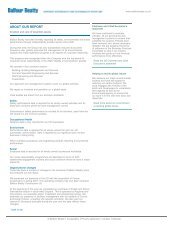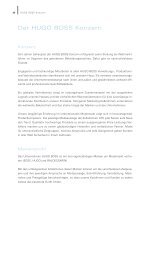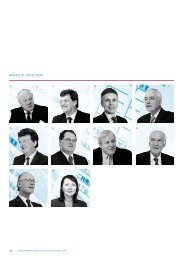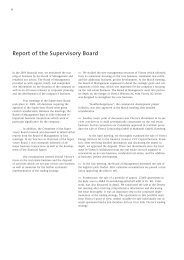E_mg_GB_03_vorne-29_3_04
E_mg_GB_03_vorne-29_3_04
E_mg_GB_03_vorne-29_3_04
Create successful ePaper yourself
Turn your PDF publications into a flip-book with our unique Google optimized e-Paper software.
MANAGEMENT SHARE STRATEGY SPECIAL SECTION MANAGEMENT REPORT FINANCIAL STATEMENTS FURTHER INFORMATION<br />
Economic Environment • Situation of the Company • Organization and Structure • Risk Report • Employees • Performance of the Subgroups • Outlook<br />
The Asian economies will also continue to grow. China’s economy will continue its rapid pace of<br />
expansion in 20<strong>04</strong>. However, the country’s currency problems still need to be resolved. Experts also<br />
expect the southeast Asian emerging markets to achieve stellar growth. Germany’s economic research<br />
institutes believe that Japan’s modest economic recovery will continue. The German Institute for<br />
Economic Research (DIW) is forecasting Japanese GDP growth of 1.5 percent for 20<strong>04</strong>. The improved<br />
political framework in the Latin American emerging markets has given their economies a new lease<br />
on life.<br />
Euro-zone economy recovering only slowly<br />
The performance of the euro-zone economy will be somewhat less impressive. The European Central<br />
Bank is forecasting that GDP in the euro-zone will grow by around 1.7 percent in 20<strong>04</strong> and roughly<br />
two percent in 2005. By contrast, the central and east European countries joining the EU on May 1<br />
this year should have good growth prospects. According to Germany’s leading economic research<br />
institutes, GDP in these countries should grow by 3.7 percent in 20<strong>04</strong>.<br />
Relatively lackluster growth is predicted for Germany. While the German government expects the<br />
country’s GDP to grow by up to two percent, the forecast of the German Institute for Economic<br />
Research is for growth of only 1.4 percent. A major reason for this sluggish performance is Germany’s<br />
chronically weak domestic demand. Nonetheless, exports are expected to grow in 20<strong>04</strong>.<br />
Slightly improved prospects for <strong>mg</strong>’s major markets<br />
According to trade associations, the growth prospects for <strong>mg</strong>’s key markets have marginally improved<br />
since last year.<br />
After a disappointing year in 20<strong>03</strong>, the German Engineering Federation (VDMA) expects to see output<br />
grow by two percent in 20<strong>04</strong>. The substantial increase in the volume of new orders received last<br />
autumn has fueled hopes that demand for capital goods will start to grow in Germany as well.<br />
Germany’s Chemical Industry Federation (VCI) is forecasting a modest recovery. After output in<br />
20<strong>03</strong> was only slightly up on the previous year, the federation expects to see output and sales in the<br />
German chemical industry rise by 1.5 percent and producer prices to fall slightly in 20<strong>04</strong>. According<br />
to its estimates, the fine and specialty chemicals sector will grow by around 2.5 percent and the<br />
pharmaceutical industry by roughly two percent.<br />
Experts believe that the relatively non-cyclical food industry, which is one of GEA’s most important<br />
markets, will continue to perform well. Demand for high-quality processed food in particular will grow.<br />
The automotive industry is cautiously optimistic about 20<strong>04</strong>. Experts see continued strong demand<br />
from Asia and eastern Europe. After a disappointing year in 20<strong>03</strong>, U.S. output is likely to increase<br />
marginally in 20<strong>04</strong>. The German Association of the Automotive Industry (VDA) is forecasting an<br />
increase of roughly three percent in new vehicle registrations in Germany. The automotive industry<br />
is one of Dynamit Nobel’s key markets.<br />
The weakness of the U.S. dollar against the euro, which intensified throughout 20<strong>03</strong> and continued<br />
at the beginning of 20<strong>04</strong>, makes accurate forecasting difficult. Some trade associations, including<br />
Germany’s Chemical Industry Federation, have already indicated that they might have to revise<br />
downwards their forecasts for 20<strong>04</strong> if the U.S. dollar continues to slide.<br />
73









